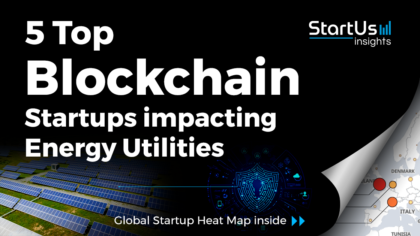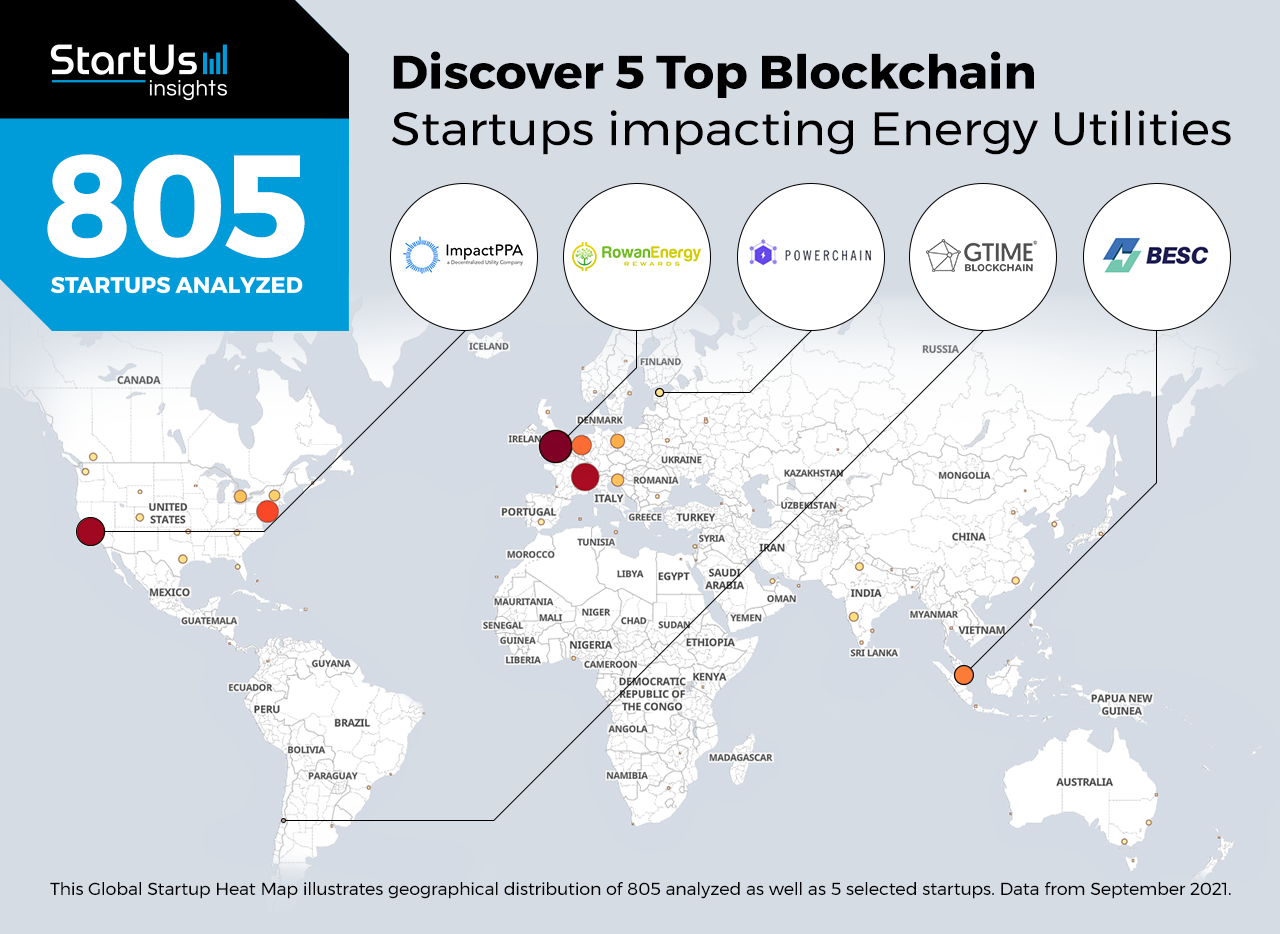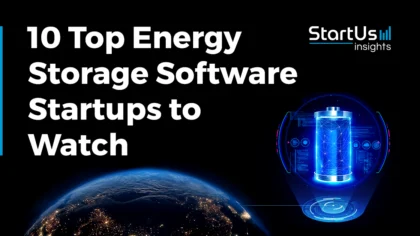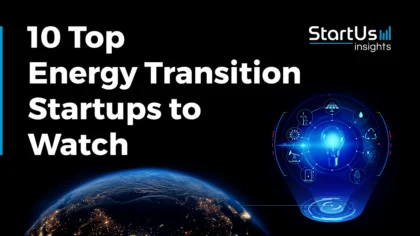Accelerate Productivity in 2025
Reignite Growth Despite the Global Slowdown
Staying ahead of the technology curve means strengthening your competitive advantage. That is why we give you data-driven innovation insights into the utility sector. This time, you get to discover 5 hand-picked blockchain startups impacting energy utilities.
Out of 805, the Global Startup Heat Map highlights 5 Top Blockchain Startups impacting Energy Utilities
The insights of this data-driven analysis are derived from the Big Data & Artificial Intelligence-powered StartUs Insights Discovery Platform, covering 2 093 000+ startups & scaleups globally. The platform gives you an exhaustive overview of emerging technologies & relevant startups within a specific field in just a few clicks.
The Global Startup Heat Map below reveals the distribution of the 805 exemplary startups & scaleups we analyzed for this research. Further, it highlights 5 startups that we hand-picked based on criteria such as founding year, location, funding raised, and more. You get to explore the solutions of these 5 startups & scaleups in this report. For insights on the other 800 blockchain solutions for energy utilities, get in touch.
Rowan Energy develops a Rewards System for Solar Power Producers
Recovering the cost of installing solar panels at home typically takes years. Consumers have the option of selling the excess energy back to the grid, but the rate is low. Hence, to compensate for this, startups are deploying blockchain to offer reward points to energy producers. With this, consumers have access to information on how much power they produce, their reward points, and how much they can cash out through computers or smartphones.
British startup Rowan Energy develops a blockchain-based reward system for solar power producers. The startup’s solution features a smart miner box that clips onto the user’s wiring and connects through WiFi. On producing energy, users earn points that are redeemable as cash in digital wallets. These points also fetch consumers discounts on other services and offer exclusively through the Rowan Rewards program.
GTIME Blockchain advances Clean Energy Traceability
With the rising demand for clean energy, verification of the energy source becomes critical. While energy attribute certificates function as proof of actions, they do not offer automatic proofs for each consumption point and, therefore, buyers have to manually request them from the energy suppliers. To make the process more dynamic, startups are providing energy traceability platforms that directly connect to renewable energy plants and provide real-time information about the energy source.
GTIME Blockchain is a Chilean startup that enables clean energy traceability. It generates immutable blockchain tokens from on-site energy measurements and incorporates them into the decentralized network through Proof of Work (PoW). Every 15 minutes, GTIME Blockchain collects the data of each energy production system attached to its platform and generates a block to be mined. It then adds the data to the chain while leaving a hash or digital signature as a record, thereby enabling energy traceability.
Powerchain enables Decentralized Energy Trading
When renewable energy production leads to excess energy, it usually remains unutilized, leading to missed profits. To address this, startups are developing decentralized platforms that allow individuals, as well as corporations, to store and transfer energy within the network. This allows energy producers to participate in energy trading to turn the stored energy into a virtual power station.
Estonian startup Powerchain provides decentralized energy storage and trading system for electricity manufacturers. A smart controller transmits signals containing the energy storage data to the Powerchain network. The system displays the accumulator capacity and how long it will take to store the electricity. When power consumption is minimal, the system stores the excess energy, using it to balance the load during peak hours.
EPC Blockchain provides a Decentralized Energy Storage Platform
Most companies often find it difficult to monetize the carbon credits generated from their energy efficiency or renewable energy projects. This is mainly because the small number of credits make it uneconomical to undertake the complicated paperwork required to certify the carbon emissions. To resolve this, startups are developing blockchain-based platforms that collect energy-saving data that are easily auditable and verifiable to certify carbon credits.
EPC Blockchain is a Malaysian startup that offers a Platform-as-a-Service (PaaS) solution. It uses decentralized storage to enable energy project owners to keep track of their energy savings and renewable energy generation through decentralized storage. This converts the emissions savings data to carbon credit equivalents for verification and auditing. Additionally, it provides shared-savings incentives or payment settlements through smart contracts.
ImpactPPA develops an Electricity Trading App
Most of the developing countries still do not have proper access to electricity. While decentralized renewable energy generation is an option, it is often very costly. Hence, to make energy more accessible, startups are utilizing blockchain technology. Blockchain-powered energy platforms enable consumers to purchase energy from any corner of the world in just a few clicks.
US-based startup ImpactPPA provides a blockchain-based prepaid mobile application for energy consumers to buy renewable energy. The startup deploys microgrids in 35 countries, which generate, store, and deliver power. This power then flows to the smart meters connected to the blockchain network. Consumers interact with their smart meters and purchase power from their mobile devices.
Discover more Utility Solutions
Startups such as the examples highlighted in this report focus on energy sharing, virtual power plants as well as decentralized energy resources (DER). While all of these technologies play a major role in advancing utility management, they only represent the tip of the iceberg. To explore more technologies for utility companies, simply get in touch to let us look into your areas of interest. For a more general overview, you can download one of our free Industry Innovation Reports to save your time and improve strategic decision-making.








